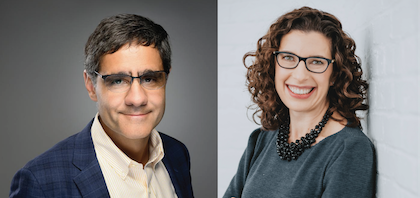Dr. Ranney is the Director of the Brown-Lifespan Center for Digital Health and practicing emergency physician, and Dr. Perakslis is the Chief Science and Digital Officer at the Duke Clinical Research Institute. The pair sat down in the List Art Center to discuss data in healthcare. Drs. Ranney and Perakslis had been corresponding for almost two years, yet this was the first time they had met in person. Their excitement to meet in person showed, as the two finally had the opportunity to discuss their mutual interests with an engaged crowd. Dr. Perakslis spoke about his work integrating healthcare and technology, and how he saw the future of the industry as it merges with data science.
Notably, the two chatted about Dr. Perakslis's trajectory from his training in chemical engineering to his current work in health data science and cybersecurity, and how he has watched digital technology become fundamental to healthcare since 1985 when he first began working at a hospital. Dr. Perakslis voiced his excitement for the "youth" to enter the world of digital healthcare since younger generations are more fluent in technology, having grown up surrounded by it. He also pointed out that they understand the risk-and-benefit balance of working with data better than those in the industry who had been introduced to technology later in their careers.
The risks and benefits of digital healthcare were one of the focal points of the discussion, as the two doctors weighed the difficulty of finding the right balance between the two; for example, the potential vulnerabilities when putting patient information online have to be balanced with the benefits of sharing patient data between care providers and with researchers. Other benefits were also reviewed— from the potential of having better diagnostics to digital therapeutics.
At the end of their conversation, Drs. Ranney and Perakslis took questions from the audience. One visitor asked about some of the most common assumptions made about digital healthcare, prompting a discussion about the importance of avoiding the inclination to provide one-hundred percent security for those whose data is online. Since a completely foolproof system isn't possible, the focus should instead be on finding existing vulnerabilities in current technologies (a "cyber-militia"), ensuring informed consent, and developing anti-discrimination policies for people whose health data might be accessed by employers.
Drs. Perakslis and Ranney provided a thoughtful and thorough dialogue about digital healthcare in what was obviously a long-anticipated conversation. We look forward to future collaborations between the two, and how this new perspective can inform Brunonians on better healthcare information decisions.
Watch the full fireside chat below:
